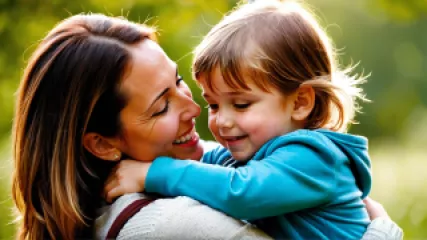Raising Resilient Kids: A Parent's Journey
Welcome to a parent's journey in raising resilient kids. As parents, we want our children to navigate life's challenges with confidence and bounce back from setbacks. Building resilience in children is essential for their mental health and well-being. In this article, we will explore strategies, tools, and resources that can help us nurture resilience in our kids.
What is Child Resilience?
Child resilience refers to a child's ability to adapt and cope with stress, adversity, and change. It involves developing skills and attitudes that enable them to face life's ups and downs with confidence, optimism, and perseverance. Resilient children are better equipped to handle challenges, manage emotions, and maintain positive mental health.
Resilience is not something innate; it can be nurtured and developed through various experiences and supportive environments. As parents, we play a crucial role in fostering resilience in our kids.
Why is Building Resilience in Kids Important?
Building resilience in kids is vital for their overall well-being and future success. Here are some reasons why:
- Mental Health: Resilient children have better mental health outcomes. They are less likely to experience anxiety, depression, and other mental health issues.
- Emotional Well-being: Resilience helps children develop emotional intelligence, allowing them to understand and manage their emotions effectively.
- Problem-Solving Skills: Resilient kids are better problem solvers. They can think creatively and find solutions to challenges they encounter.
- Healthy Relationships: Resilience fosters healthy relationships with peers, family, and the community. It enables children to navigate conflicts and maintain positive connections.
- Success in Adulthood: Resilience is a valuable life skill that prepares children for the challenges they will face as adults. It contributes to their success academically, professionally, and personally.
How Can We Support Children's Resilience?
Now that we understand the importance of building resilience in kids, let's explore some practical strategies and activities to support our children's resilience:
1. Foster a Nurturing and Supportive Environment
A warm and supportive environment at home forms the foundation for building resilience in children. Here are some ways to create such an environment:
- Show unconditional love and acceptance towards your child.
- Encourage open communication and active listening.
- Provide a safe space for your child to express their emotions.
- Set realistic expectations and celebrate their achievements.
- Model healthy coping strategies and problem-solving skills.
2. Teach Emotional Regulation
Helping children understand and manage their emotions is key to resilience. Here are some techniques to teach emotional regulation:
- Label emotions and encourage your child to express them.
- Teach deep breathing exercises and mindfulness techniques.
- Encourage journaling or drawing as a way to process emotions.
- Validate their feelings and provide guidance on appropriate responses.
3. Encourage Problem-Solving Skills
Resilient children are resourceful problem solvers. Here's how you can foster problem-solving skills:
- Encourage critical thinking and decision-making.
- Teach them to break down problems into manageable steps.
- Brainstorm solutions together and discuss potential outcomes.
- Allow them to make age-appropriate choices and learn from mistakes.
4. Promote a Growth Mindset
A growth mindset is the belief that abilities can be developed through effort and practice. Here's how you can promote a growth mindset in your child:
- Praise effort, perseverance, and progress rather than just outcomes.
- Encourage them to see mistakes as learning opportunities.
- Teach them that challenges are part of the learning process.
- Model a growth mindset by embracing challenges and continuous learning.
5. Foster Healthy Relationships
Positive relationships contribute to resilience in children. Here's how you can foster healthy connections:
- Encourage empathy and kindness towards others.
- Teach effective communication and conflict resolution skills.
- Provide opportunities for social interactions and community involvement.
- Model healthy relationships within your family and friendships.
6. Encourage Independence and Autonomy
Resilient children have a sense of control over their lives. Here's how you can encourage independence:
- Assign age-appropriate responsibilities and chores.
- Support their decision-making and problem-solving skills.
- Encourage them to pursue their interests and passions.
- Allow them to experience natural consequences of their actions within safe boundaries.
Seeking Professional Help: Online Therapy for Kids
In some cases, children may benefit from professional support to enhance their resilience. Online therapy for kids provides a convenient and accessible option for parents seeking therapeutic support for their children's mental health.
Virtual therapy sessions with licensed child therapists can help children develop coping skills, manage stress, and overcome challenges. These sessions provide a safe space for children to express their emotions and work through difficulties under the guidance of a trained professional.
Conclusion
Raising resilient kids is a journey that requires patience, love, and intentional effort. By creating a nurturing environment, teaching emotional regulation, fostering problem-solving skills, promoting a growth mindset, nurturing healthy relationships, and encouraging independence, we can support our children's resilience.
Remember, every child is unique, and building resilience is an ongoing process. Be present for your child, and don't hesitate to seek professional help when needed. Together, we can empower our children to navigate life's challenges with strength and resilience.
Note: The information provided in this article is for educational purposes only and should not replace professional advice. If you have concerns about your child's mental health, please consult a qualified healthcare professional.






